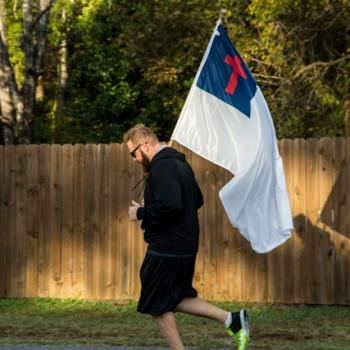While I love John Piper and have greatly benefited from his ministry, especially in the early days of my faith, I feel that his latest article has been a gigantic misstep in many ways. Below, I interact with what I sense to be the thrust of his argument in four main counter-points. One could go point-by-point, however, many of Piper’s nine points are overlapping in their theme and there is no need to do so. This is, unfortunately, one of the instances where I believe a man has been more guided by personal conviction than biblical implication. This should be readily apparent by the self-contradictory nature of some of his points that I will demonstrate below – yet even more so in the blatant misuse of scripture from its immediate context.
1.) Death does not a martyr make
While it is tempting to say that a Christian who dies at the hand of violence has become a martyr, this isn’t the case. Throughout all of church history, there have been fairly firm convictions and qualifications on what it takes to be a martyr. While death is a necessary component of this, in and of itself, death does not qualify one as a martyr. Dying as a Christian in a violent act does not even qualify one as a martyr. Historically, martyrdom has been defined as a Christian suffering the ultimate punishment this earth can offer – because of the testimony of the gospel they bear. This does not necessitate they be in the midst of preaching the gospel to be considered a martyr, but rather, they are directly targeted and quickly assailed on the basis of the proclamation of the gospel of Christ.
However, this offers even more nuance in one respect, for many who have adorned the banner of “Christian” in our history have been snuffed out – yet they were not considered martyrs by the church. Why is this? Some reasons involve dying for what they believed to be true and according to the gospel, yet unfortunately, it wasn’t. Others involve men who brazenly sought out martyrdom for the sake of vain glory. There are a host of others, but these two examples serve the point well. If one who died for convictions they believed were biblical, yet did not attain the status of a martyr after their demise, it is far beyond a stretch to say a victim of violent crime where one’s faith is not even known to the assailant becomes a martyr.
2.) Persecution is not blind violence
The biblical witness resounds with a testimony toward what persecution is. Piper is even quick to quote quite a few of these passages in more than one of his points – however, he vaguely defines persecution in this context. This is disappointing, and truthfully, sad, seeing that Piper has so often ably defined what true persecution is. When Peter speaks to the one who suffers unjustly; when the apostles were beaten, stoned, or executed; when Christ was sought after by the hostile Jews – it was for the express result of their faith and the testimony of the gospel. By extension, this is the substance of Piper’s argument, for by refusing to bear arms and protect others against an assailant, he is arguing that they are directly suffering for the gospel.
However, this is a dangerously faulty presupposition on many levels because it assumes that Christians suffering unjustly in the midst of violent, unpremeditated crime are suffering for the sake of the gospel. Unless the assailant has a personal vendetta against Christians and has intentionally sought them out for this reason, rather than for their goods, it just isn’t the case. Persecution has an object: the gospel, not principles adorned by personal convictions and assumed implications of the gospel. This is at the crux of John Piper’s argument – as all of his points deal in the assumption of random acts of violence being the result of one’s faith.
3.) Self-defense is not vengeance
Scripture is replete with examples of casuistic laws in order to specifically determine what happens in precisely this case. Exodus 22:2-3 is just one that determines a homeowner, if striking a thief dead, has no blood-guilt upon their hands. The oft quoted, “turn the other cheek” has nothing to do with violence with intent to kill, but everything to do with receiving the insult of being back-handed across the face. To slap someone in the face is an incredible insult that while demeaning, is not intended to take the life of the innocent. It is meant to bring shame, which in an honor and shame society is a big deal. For a Christian to take a slap to the face, offer the other side for another backhand, would be socially radical – for they would be willing to double-down on open shame.
Yet perhaps the most troubling portion of Piper’s argument in this point is found within the assumption that revenge is the same as self-preservation, or preservation of another’s life. Revenge begets vindictiveness; self-defense is reactionary. Revenge makes you the arbiter of justice, as you determine a fitting punishment for the crime; self-defense or preservation of another’s life is not a means of intentional homicide. Even preparation of one discerning what they might do in a given scenario is not premeditated homicide; all of it is reactionary and under the constraints of an ethos to preserve life. To give a clear example: seeking vengeance would be going to shoot up an abortion clinic because of their evil practice; preservation of life and loving one’s neighbor, would be an officer gunning down the assailant and protecting those same people who revile Christ. Now, swap out the officer with an armed civilian. Should he let the murderous tyrant shoot up the abortion clinic and show deference to the gun-toting assailant over preference to the abortionists he is attacking?
4.) Owning and using a firearm is not mistrusting in the Lord’s sovereign protection
This argument falls flat on the face. By implication, it is a form of blind determinism that by essence, argues for complete passivity. Carry this implication into other spheres of biblical ethics and it would be quickly revealed how very narrow-sighted this is. The simple point being: simply because God has ordained all things does not mean He has left us without a means to walk in that. In part, the civil authorities, by extension of their power to bear the sword, have given that right to others. We have similar case laws on the basis of self-defense as found in the Old Testament. Were the Jews, whom bore no blood guilt in the death of a thief, condemned for their lack of faith in the sovereign protection of God? Would we likewise be found guilty of blood for protecting another? Is God’s immediate justice not meted out through intermediary means?
Some crimes have immediate implications by virtue of their crime. Some acts have immediate consequences by virtue of what they are. This is a simple principle of wisdom laid out plainly over and again throughout the book of Proverbs. The point being, the criminal has laid a snare for themselves by unintended consequence to their heinously sinful acts. There is a reason why Solomon plainly states that one who lays siege to the innocent will end in death; it can and does contain a physical and spiritual dimension, and based on casuistic law, does not require that this penalty be met by only those who are in the position of civil government.
In conclusion, I was genuinely discouraged in seeing Piper’s response for a plethora of reasons, from laying a burden down on the conscious that is simply not in the text, to saying one would be in the wrong for the preservation of innocent life. I am not saying I am in complete agreement with Jerry Falwell Jr’s mildly cavalier attitude, yet I am in complete disagreement with Piper on this extreme form of pietism that places inappropriate emphasis on rolling over like a dog rather than being a man of valor. If I am being quite frank, it is cowardice, misleading, inappropriately making martyrs of random victims of violence, and more. I’ve seen hosts of people saying how they would use less fatal methods to subdue an attacker, but I daresay you haven’t met a crack-head who wants your money while you are unarmed.
Yet more so, I believe you missed the point. The purpose in Piper’s post was not necessarily the method by which you use to defend yourself against the assailant, however, but that the disposition of a cavalier heart is the same as any means of self-defense. I would naturally agree that a cavalier heart toward the potential taking of an image bearer is not right – yet I would emphatically disagree on all of Piper’s premises, seeing that he is conflating defense with the desire to kill. The two are simply not the same, as one intentionally seeks to end a life and takes glee over it, while the other seeks to uphold the life of the innocent, and does not rejoice in the death of a sinner.













